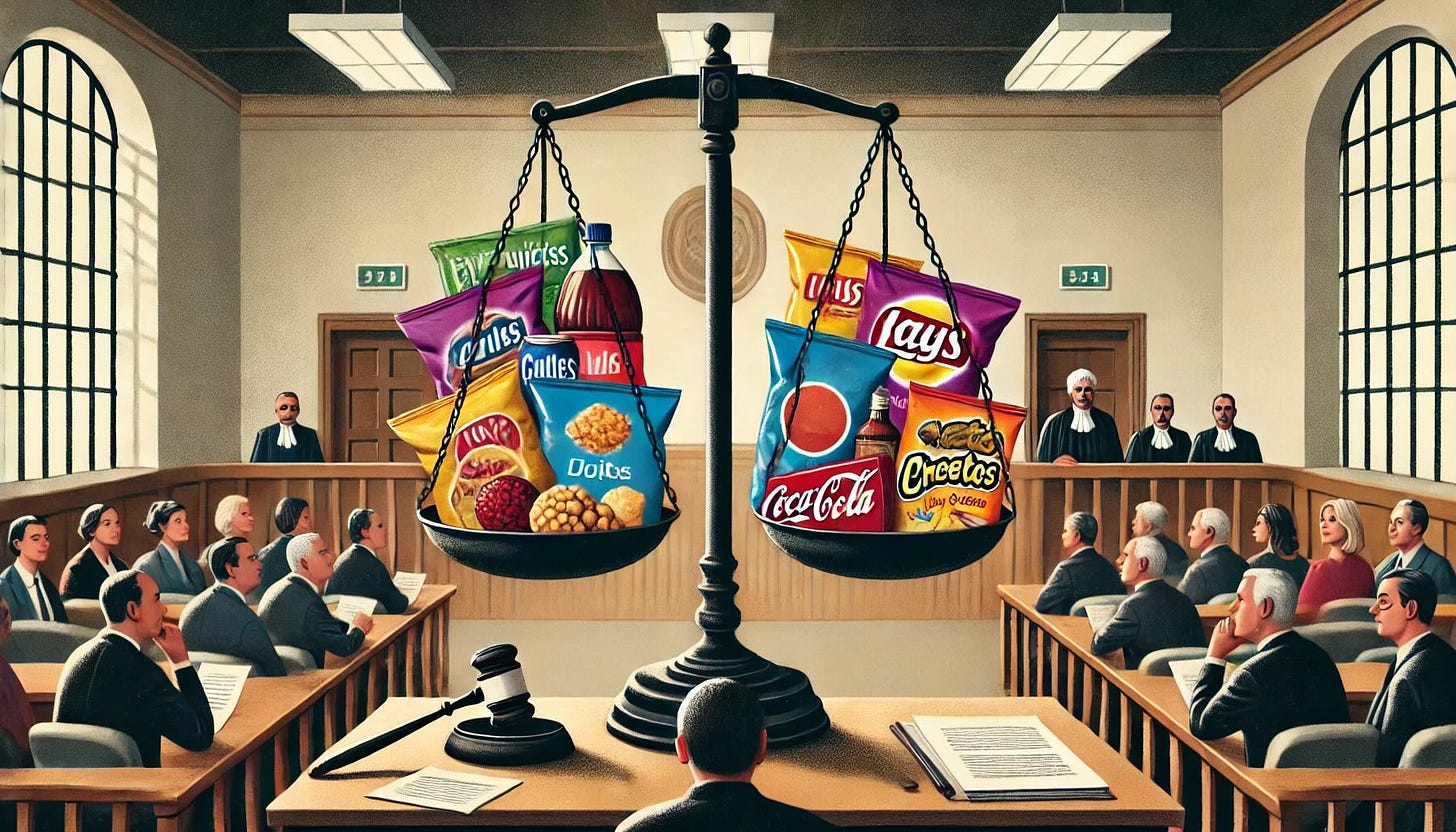Why Courts Are Likely to Favor Food Companies in Martinez v. Kraft Heinz et al.—but the Debate Is Far from Over
Despite strong legal defenses from food giants, the lawsuit highlights growing scrutiny of ultra-processed foods and their role in public health crises.
A sweeping lawsuit, Martinez v. Kraft Heinz et al., takes aim at some of the largest food manufacturers, alleging that ultra-processed foods (UPFs) are harmful and intentionally designed to be addictive. The plaintiff accuses these companies of knowingly marketing their products, particularly to children, while concealing the associated health risks, leading to an epidemic of diet-related diseases such as Type 2 diabetes and non-alcoholic fatty liver disease.
While the case raises important questions about corporate responsibility and public health, federal courts are likely to side with the defendants—and for compelling legal reasons. However, this case also signals mounting pressure on the food industry, suggesting that even a legal victory could mark the beginning of more scrutiny and potential regulation.
The Challenge of Proving Causation
The plaintiff’s biggest hurdle is causation, a cornerstone of tort law. Unlike tobacco or pharmaceuticals, where direct links to harm are well-documented, UPFs are consumed as part of a broader diet. Diseases like type 2 diabetes and fatty liver disease often result from multiple factors, including genetics, lifestyle, and overall nutrition. Courts require clear evidence connecting a specific defendant’s products to the plaintiff’s injuries—something this case is unlikely to provide.
The plaintiff’s claim that UPFs are addictive further complicates the issue. While emerging research suggests these foods may hijack reward systems in the brain, such claims are not universally accepted. Defendants will likely argue that UPFs, while highly palatable, do not meet established definitions of addiction comparable to nicotine or opioids.
Consumer Responsibility and Freedom of Choice
The defendants are also expected to argue that consumers are ultimately responsible for their dietary choices. Nutritional labels provide clear information about ingredients, calorie content, and serving sizes, enabling informed decisions. Parents, in particular, hold significant power over what their children consume.
This argument, while compelling, overlooks the power of sophisticated marketing. The plaintiff’s case emphasizes how food companies target children with mascots, colorful packaging, and partnerships with popular media franchises. Such tactics can blur the lines between informed choice and manipulation, raising questions about whether consumers are truly free to make rational decisions.
Regulatory Compliance as a Shield
The defendants are likely to stress their compliance with federal food safety and labeling laws. Ingredients in UPFs are approved by the Food and Drug Administration, and product labels meet legal disclosure requirements. If the products were inherently unsafe, regulatory agencies would be expected to intervene.
Courts are often reluctant to penalize companies for actions that align with existing regulations. However, this defense does not address whether those regulations are adequate. Critics argue that the FDA’s oversight of additives and processing techniques has not kept pace with advances in nutritional science.
The First Amendment and Marketing Practices
The lawsuit takes particular aim at advertising practices, accusing companies of exploiting children’s vulnerabilities to drive sales. While the ethical implications of this strategy are troubling, the legal framework favors the defendants. Commercial speech is protected under the First Amendment as long as it is not false or misleading.
That said, ethical concerns remain. Marketing campaigns that embed UPFs in children’s media and social spaces may be legally permissible but contribute to systemic public health issues. Courts are unlikely to hold companies liable on these grounds alone, but the broader conversation about advertising standards could gain traction as a result of this case.
A Narrow Decision Is Likely
If courts ultimately side with the defendants, they are likely to issue a narrow decision focused on the plaintiff’s inability to prove causation. Such a ruling would emphasize individual responsibility and the defendants’ adherence to existing regulations while leaving open the possibility of future litigation if stronger evidence emerges.
This approach would shield food companies from sweeping liability while signaling that courts are paying attention to evolving public health concerns. The decision would likely stop short of absolving companies of accountability in perpetuity, leaving the door open for stricter advertising rules or labeling requirements down the road.
The Bigger Picture: Public Health and Corporate Responsibility
Even if the defendants prevail, the issues raised by this lawsuit are unlikely to fade. Ultra-processed foods dominate the American diet, and their role in rising rates of obesity and chronic disease cannot be ignored. Aggressive marketing practices, particularly those aimed at children, are increasingly seen as ethically questionable, if not outright harmful.
Policy solutions outside the courtroom could play a critical role in addressing these challenges. Stricter regulations on child-targeted advertising, clearer labeling requirements, and incentives for healthier food production could help mitigate the harms associated with UPFs. Education campaigns and subsidies for fresh, whole foods could also shift consumer behavior over time.
A Wake-Up Call for the Food Industry
While Martinez v. Kraft Heinz et al. is unlikely to result in a legal loss for the food industry, it is a warning shot. Public attitudes toward ultra-processed foods are shifting, and regulatory scrutiny is likely to increase. Just as Big Tobacco eventually faced accountability for its role in public health crises, food companies may find themselves under greater pressure to align their practices with evolving societal expectations.
Adding to this shift, the appointment of Robert F. Kennedy Jr. to lead the Department of Health and Human Services under the Trump administration signals growing political interest in reexamining food industry practices. Kennedy, known for his focus on corporate accountability and public health, could push for stricter oversight of the industry, further increasing the pressure for change.
The courts may shield these companies today, but the battle over ultra-processed foods is far from over. The food industry would do well to heed this moment and proactively embrace transparency and reform. If they don’t, the next lawsuit—or a wave of regulation—could prove far harder to defend.

